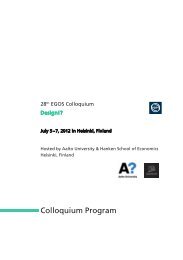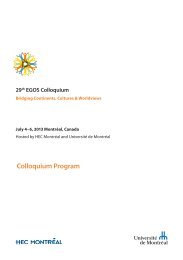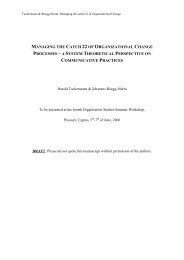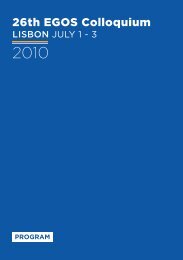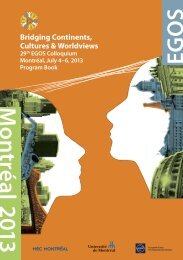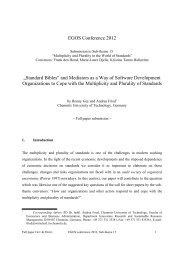A single set of standards and the multiplicity of interpretations - EGOS
A single set of standards and the multiplicity of interpretations - EGOS
A single set of standards and the multiplicity of interpretations - EGOS
You also want an ePaper? Increase the reach of your titles
YUMPU automatically turns print PDFs into web optimized ePapers that Google loves.
(an existing word or a neologism) in <strong>the</strong> target language because <strong>the</strong> definition helps <strong>the</strong>m<br />
underst<strong>and</strong> <strong>the</strong> essential meaning <strong>of</strong> <strong>the</strong> term.<br />
4.2 Interpretation <strong>of</strong> <strong>the</strong> Source Language Text<br />
One <strong>of</strong> <strong>the</strong> main problems in <strong>the</strong> translation <strong>of</strong> IFRS is not to terminology (which is also a difficult issue)<br />
but underst<strong>and</strong>ing what something means. A <strong>single</strong> sentence in which <strong>the</strong>re is no foreign word can be<br />
discussed in <strong>the</strong> group for a long time. Sometimes <strong>the</strong> text can be understood in several ways. Also native<br />
English speakers who we consult have difficulties [with underst<strong>and</strong>ing <strong>the</strong> text].<br />
Interviewee 1<br />
I remember that based on my own work when I tried to do so that I first translate <strong>and</strong> <strong>the</strong>n have a look at<br />
<strong>the</strong> translation done by <strong>the</strong> Translator. That when <strong>the</strong> sentence is five six lines long <strong>the</strong>n… Well, finding<br />
<strong>the</strong> idea <strong>and</strong> a fluent translation…it takes a remarkably long time. [---] But also in <strong>the</strong> role <strong>of</strong> <strong>the</strong> reviewer<br />
you should also see, not only if it looks fluent by also that <strong>the</strong> idea corresponds to what has been said in<br />
<strong>the</strong> original text.<br />
Interviewee 3<br />
The translator identified <strong>the</strong> interpretation <strong>of</strong> <strong>the</strong> source text as one <strong>of</strong> key issues in <strong>the</strong><br />
translation. This shows that <strong>the</strong> meaning <strong>of</strong> <strong>the</strong> <strong>st<strong>and</strong>ards</strong> cannot be rendered accurately in<br />
ano<strong>the</strong>r language if <strong>the</strong> translator does not underst<strong>and</strong> <strong>the</strong> source text. Problems in<br />
underst<strong>and</strong>ing/interpretation <strong>of</strong> <strong>the</strong> original can be linked to how <strong>the</strong> text structured in verbally<br />
(including syntax) or to <strong>the</strong> substance <strong>of</strong> <strong>the</strong> text. As regards <strong>the</strong> syntax, both translators noted for<br />
instance that it is not always clear to which word or phrase a particular pronoun refers to (i.e.<br />
what is <strong>the</strong> antecedent in <strong>the</strong> sentence), <strong>and</strong> this makes underst<strong>and</strong>ing <strong>of</strong> <strong>the</strong> original <strong>st<strong>and</strong>ards</strong> a<br />
more difficult task. Concerning <strong>the</strong> substance, it is sometimes difficult to underst<strong>and</strong> <strong>the</strong> content<br />
<strong>of</strong> a st<strong>and</strong>ard if it regulates reporting <strong>of</strong> a phenomenon that is not common in <strong>the</strong> target language<br />
society or if <strong>the</strong> phenomenon exists but it has been reported in a different way. In <strong>the</strong> latter case,<br />
especially dynamic but also formal equivalence is difficult to achieve as rendering <strong>the</strong> meaning<br />
accurately in ano<strong>the</strong>r language is particularly problematic when <strong>the</strong> underlying phenomenon is<br />
complex <strong>and</strong> [to be continued]<br />
4.3 Pr<strong>of</strong>essional Translator´s Lack <strong>of</strong> Accounting Knowledge<br />
Today <strong>the</strong> translations <strong>of</strong> <strong>the</strong> endorsed <strong>st<strong>and</strong>ards</strong> are provided by EU’s Directorate General <strong>of</strong><br />
Translation (DGT), <strong>and</strong> in practice <strong>the</strong>y are translated ei<strong>the</strong>r by in-house translators <strong>of</strong> DGT or<br />
outsourced to <strong>the</strong> external contractors who are recruited through a tendering procedure (see EC<br />
17



